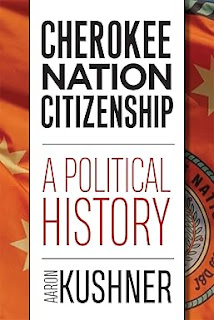
He applied the "Page 99 Test" to his new book, Cherokee Nation Citizenship: A Political History, with the following results:
Page 99 is five pages off from the book’s midpoint—it lands in the middle of the middle chapter. It discusses the plight of formerly enslaved peoples (called Freedmen) in the Cherokee Nation after the Treaty of 1866 reshaped Cherokee-United States relations following the American Civil War. Readers will find here the story of Moses Lonian, born into slavery in the Cherokee Nation in 1857, and his efforts to be counted as a Cherokee citizen after the war. A portion of the page reads:Learn more about Cherokee Nation Citizenship at the University of Oklahoma Press website.The situation of the freedmen and their requests to become part of the Cherokee Nation provided US officials an opportunity to bring the Cherokee Nation closer to the norms established by American politics. The Cherokee resistance to incorporating the freedmen, and the freedmen’s pleas to the United States for help, gave US officials an excuse to condemn the Cherokee Nation as insubordinate, unjust, and ineffective—a condemnation that eventually led to the dissolution of the Cherokee Nation itself.The Page 99 Test actually works well in this case. It gives the browser a quick sense of the complicated dynamics at play over the difficult question of tribal citizenship. Cherokee Nation leaders were determined to assert their sovereignty against the United States—which included preserving the ability to count and claim their own citizens. The war—in which the Cherokee Nation initially sided with the Confederacy before a large number returned to the Union camp—and the long-standing practice of race-based chattel slavery among some Cherokees, however, contributed to a treaty (which, among other things, gave Freedmen Cherokee Nation citizenship) that many US leaders saw as a means to gradually demolish the Cherokee Nation government. Freedmen and certain Cherokee leaders all turning to the United States for help over questions of citizenship (and hordes of white squatters on Cherokee lands) gave certain exploitative US officials the opportunity that they wanted to effectively end tribal governance in 1907.
The debate over Freedmen citizenship in the Cherokee Nation did not end in 1907 (and neither did the Cherokee Nation)—a US District Court ruled on the matter in 2017 and the subject has continued to periodically draw the attention of Cherokee Nation politicians ever since. I can therefore say that the Page 99 Test does indeed work for this book as a primer for a much richer political history.
--Marshal Zeringue



